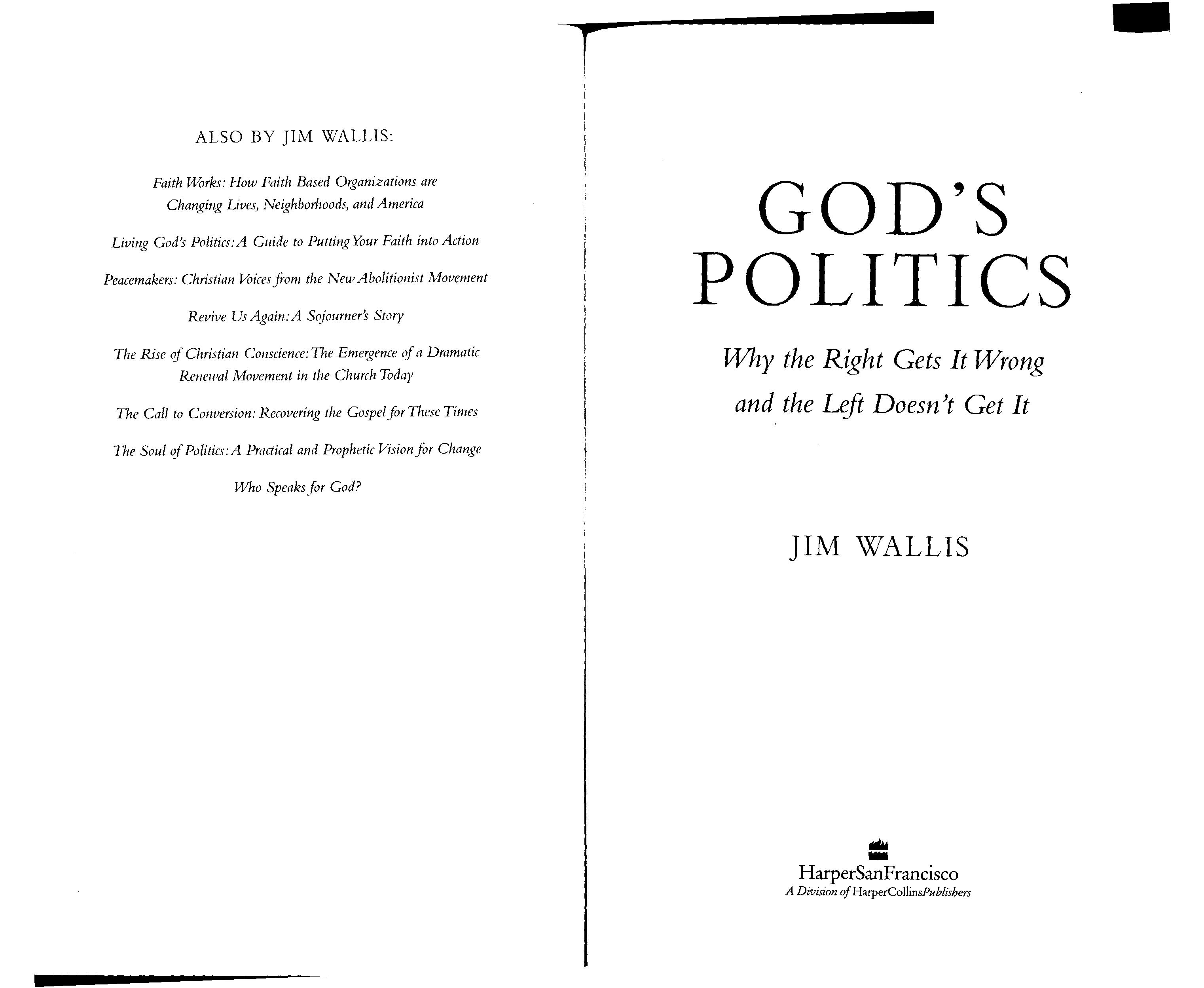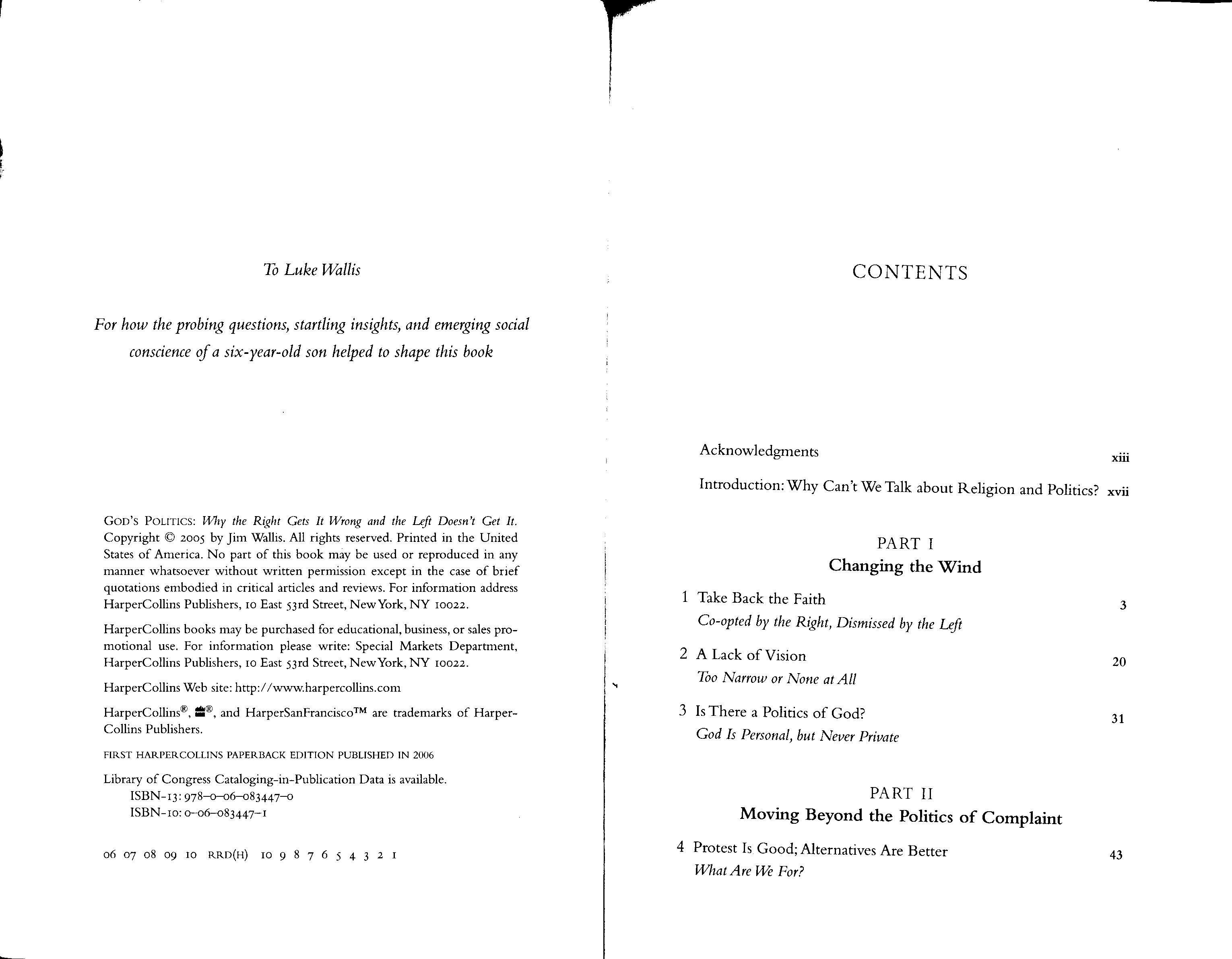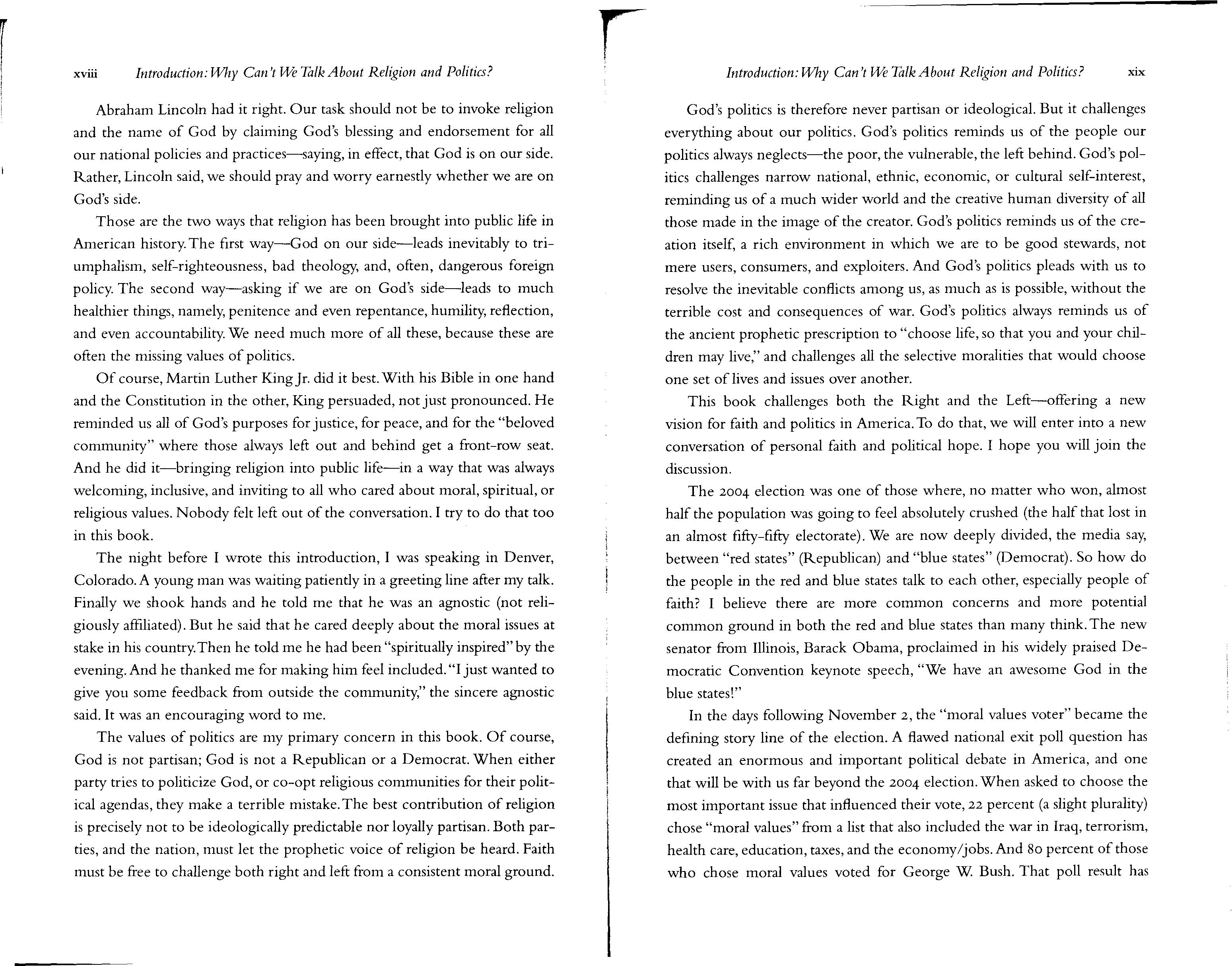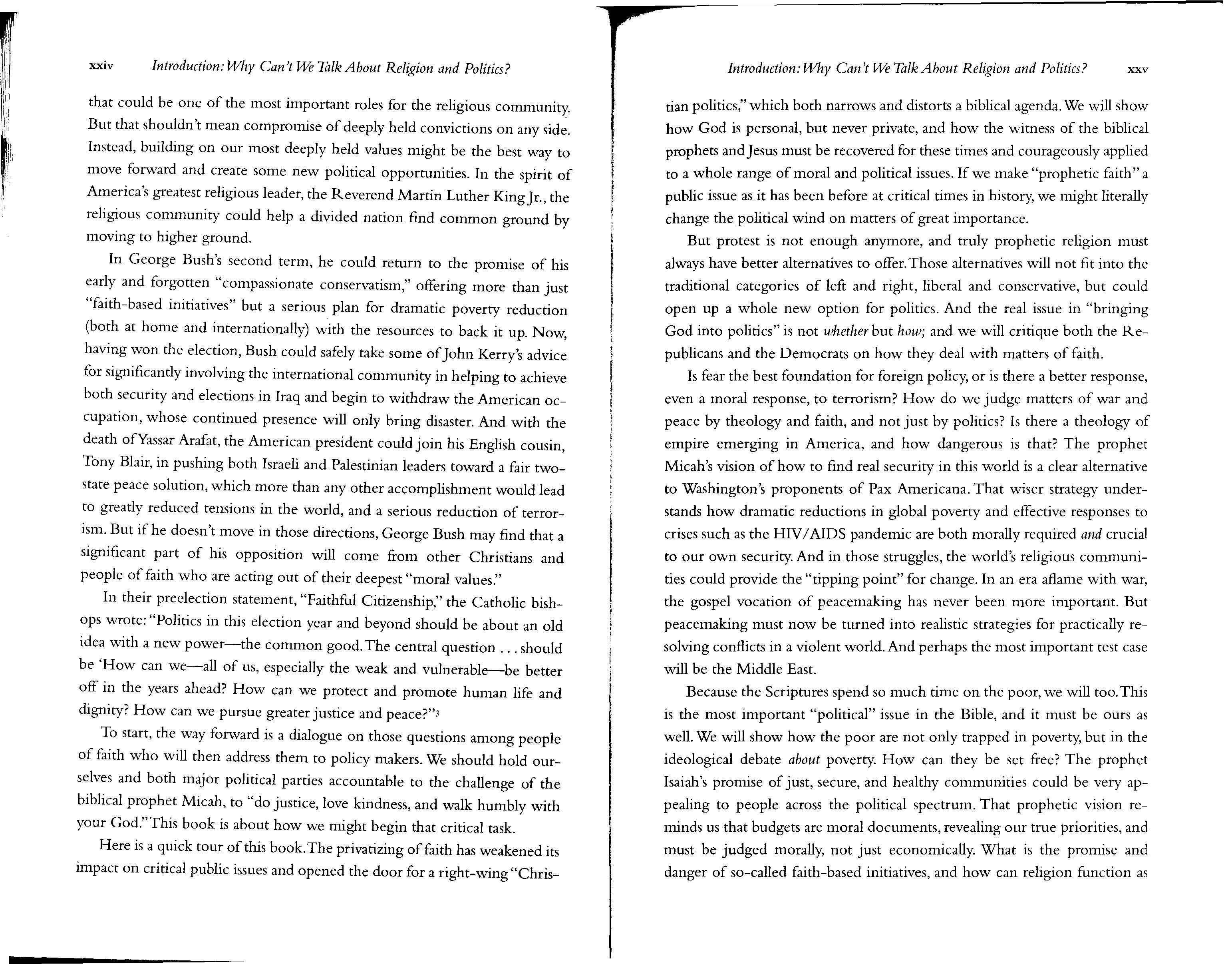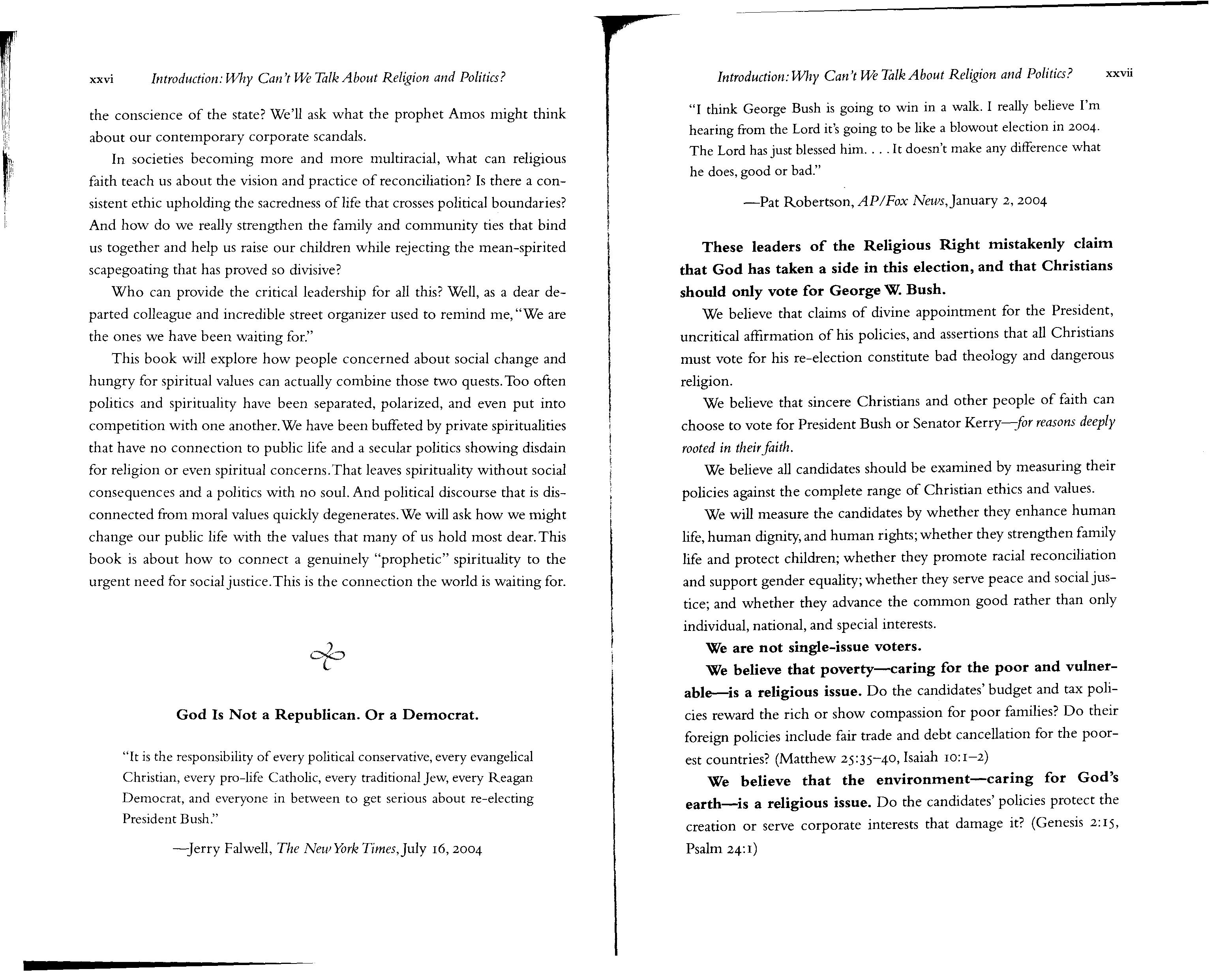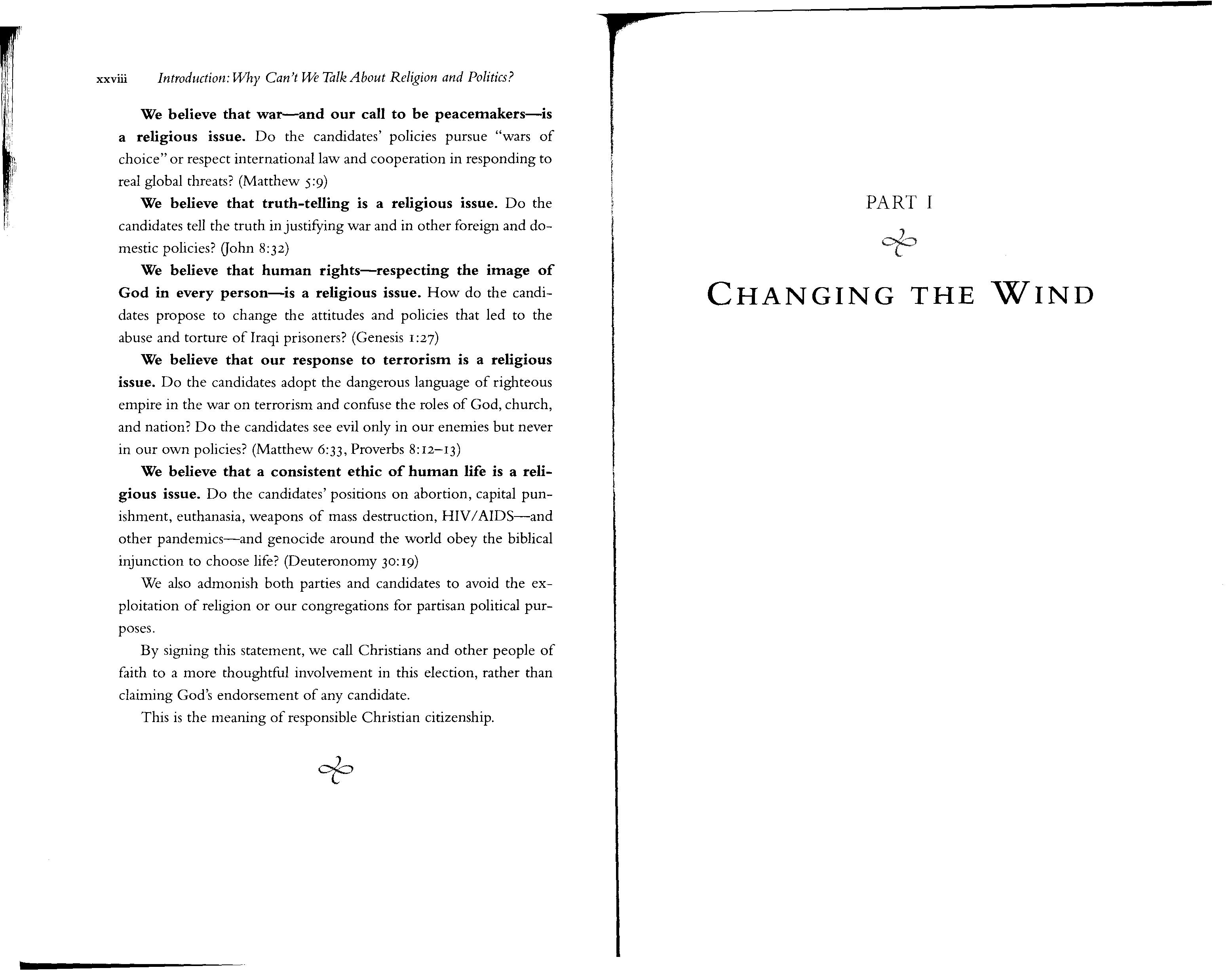GOD'S POLITICS
JIM WALLIS
To Luke Wallis
For how the probingquestions,startlinginsights,and emergingsocial conscienceefa six-year-oldson helped to shape this book
Acknowledgments
Introduction: Why Can't We Talk about Religion and Politics?
Gan's POLITICS: Why the Right Gets It Wrong and the Left Doesn't Get It.
Copyright © 2005 by Jim Wallis. All rights reserved. Printed in the United States of America. No part of this book may be used or reproduced in any manner whatsoever without written permission except in the case of brief quotations embodied in critical articles and reviews. For information address HarperCollins Publishers, IO East 53rd Street, New York, NY 10022.
HarperCollins books may be purchased for educational, business, or sales promotional use. For information please write: Special Markets Department, HarperCollins Publishers, IO East 53rd Street, New York, NY 10022.
HarperCollins Web site: http:/ /www.harpercollins.com
HarperCollins®, :Ii:®,and HarperSanFrancisco™ are trademarks of HarperCollins Publishers.
FIRSTHARPERCOLLINSPAPERBACKEDITIONPUBLISHEDIN 2006
Library of Congress Cataloging-in-Publication Data is available. ISBN-13: 978-0--06-083447-o ISBN-rn: o-06-o83447-1
INTRODUCTION
-Why Can't -We Talk about Religion and Politics?
WHY CAN'T WE TALK about religion and politics? These are the two topics you are not supposed to discuss in polite company. Don't break up the dinner party by bringing up either of these subjects! That's the conventional wisdom. Why? Perhaps these topics are too important, too potentially divisive, or raise the issues of core values and ultimate concerns that make us uncomfortable.
Sojournersmagazine, where I serve as editor, commits the offense, in every single issue, of talking about faith, politics, and culture.Yet our subscriber and on-line lists are growing, especially among a younger generation. I am also on the road a lot, speaking almost every week to very diverse audiences of people. I hear and feel the hunger for a fuller, deeper, and richer conversation about religion in public life, about faith and politics. It's a discussion that we don't always hear in America today. Sometimes the most strident and narrow voices are the loudest, while more progressive, prophetic, and healing faith often gets missed. But the good news is about how all that is changingreally changing.
Abraham Lincoln had it right. Our task should not be to invoke religion and the name of God by claiming God's blessing and endorsement for all our national policies and practices-saying, in effect, that God is on our side. Rather, Lincoln said, we should pray and worry earnestly whether we are on God's side.
Those are the two ways that religion has been brought into public life in American history. The first way-God on our side-leads inevitably to triumphalism, self-righteousness, bad theology, and, often, dangerous foreign policy. The second way-asking if we are on God's side-leads to much healthier things, namely, penitence and even repentance, humility, reflection, and even accountability. We need much more of all these, because these are often the missing values of politics.
Of course, Martin Luther King Jr. did it best. With his Bible in one hand and the Constitution in the other, King persuaded, not just pronounced. He reminded us all of God's purposes for justice, for peace, and for the "beloved community" where those always left out and behind get a front-row seat. And he did it-bringing religion into public life-in a way that was always welcoming, inclusive, and inviting to all who cared about moral, spiritual, or religious values. Nobody felt left out of the conversation. I try to do that too in this book.
The night before I wrote this introduction, I was speaking in Denver, Colorado. A young man was waiting patiently in a greeting line after my talk. Finally we shook hands and he told me that he was an agnostic (not religiously affiliated). But he said that he cared deeply about the moral issues at stake in his country. Then he told me he had been "spiritually inspired" by the evening. And he thanked me for making him feel included. "I just wanted to give you some feedback from outside the community," the sincere agnostic said. It was an encouraging word to me.
The values of politics are my primary concern in this book. Of course, God is not partisan; God is not a Republican or a Democrat. When either party tries to politicize God, or co-opt religious communities for their political agendas, they make a terrible mistake. The best contribution of religion is precisely not to be ideologically predictable nor loyally partisan. Both parties, and the nation, must let the prophetic voice of religion be heard. Faith must be free to challenge both right and left from a consistent moral ground.
rIntroduction:Why
Can't 1,# Talk About Religion and Politics? xix
God's politics is therefore never partisan or ideological. But it challenges everything about our politics. God's politics reminds us of the people our politics always neglects-the poor, the vulnerable, the left behind. God's politics challenges narrow national, ethnic, economic, or cultural self-interest, reminding us of a much wider world and the creative human diversity of all those made in the image of the creator. God's politics reminds us of the creation itself, a rich environment in which we are to be good stewards, not mere users, consumers, and exploiters. And God's politics pleads with us to resolve the inevitable conflicts among us, as much as is possible, without the terrible cost and consequences of war. God's politics always reminds us of the ancient prophetic prescription to "choose life, so that you and your children may live," and challenges all the selective moralities that would choose one set of lives and issues over another.
This book challenges both the Right and the Left-offering a new vision for faith and politics in America. To do that, we will enter into a new conversation of personal faith and political hope. I hope you will join the discussion.
The 2004 election was one of those where, no matter who won, almost half the population was going to feel absolutely crushed (the half that lost in an almost fifty-fifty electorate). We are now deeply divided, the media say, between "red states" (Republican) and "blue states" (Democrat). So how do the people in the red and blue states talk to each other, especially people of faith? I believe there are more common concerns and more potential common ground in both the red and blue states than many think. The new senator from Illinois, Barack Obama, proclaimed in his widely praised Democratic Convention keynote speech, "We have an awesome God in the blue states!"
In the days following November 2, the "moral values voter" became the defining story line of the election. A flawed national exit poll question has created an enormous and important political debate in America, and one that will be with us far beyond the 2004 election. When asked to choose the most important issue that influenced their vote, 22 percent (a slight plurality) chose "moral values" from a list that also included the war in Iraq, terrorism, health care, education, taxes, and the economy /jobs. And 80 percent of those who chose moral values voted for George W Bush. That poll result has
sparked a firestorm in the media and in Washington's political circles about who gets or doesn't get the moral values issue. The conventional wisdom claims that the Republicans do and the Democrats don't get it, that the moral values responders simply meant voters who are against abortion and gay marriage, and that religious conservatives won the election for George Bush, which was Karl Rove's strategy all along. That perception has both thrilled and emboldened the religious Right, whose leaders and organizations are now flexing their political muscles by making demands on an administration they claim to have helped re-elect.
I have no doubt that the issues of abortion and gay marriage played an important role in the political outcome. But it was not necessarily the religious Right that won this election. Demographic information in the same exit polls showed that nationally, 52 percent of Catholics voted for Bush, 5 percent more than in 2000; 44 percent of Latinos, 9 percent higher; and II percent of African Americans, 2 percent higher. In what proved to be the key state, Ohio, 55 percent of Catholics went for Bush, 5 percent higher than in 2000; and 16 percent of African Americans, 7 percent more than four years ago. And conservative moral values likely played a part in those increases.'
But, of course, if I were a Christian who cared deeply about peace I would have likely checked the war in Iraq (one of the choices) instead of moral values, and if I were the Catholic coordinator of a food pantry I would have checked the closest thing I could find to poverty, which would have been the economy or health care.
The single moral values question was a whole different kind of choice than the rest of the "issues," ignoring the moral values inherent in those other concerns. Putting an ambiguous moral values choice in a list of specific issues skewed the results. Another way of looking at the poll is to group the issues together. In that case, war/peace values received 34 percent and economic values 33 percent.
A week after the election another poll, conducted by Zogby International, confirmed that when a broader and more specific list of moral issues was presented, the results were quite different. When asked "Which moral issue most influenced your vote?" 42 percent chose the war in Iraq while 13 percent said abortion, and 9 percent said same-sex marriage. When asked to
IIntroduction:Why Can't We Talk About Religion and Politics? xxi
choose the most urgent moral problem in American culture, 33 percent selected greed and materialism; 31 percent, poverty and economic justice; r6 percent, abortion; and r2 percent, same-sex marriage. The "greatest threat to marriage" was identified as infidelity by 3r percent, rising financial burdens by 25 percent, and same-sex marriage by 22 percent. But regardless of the validity of various polls and poll questions, values are now the hot topic in American politics.
I welcome the discussion of "moral values." And I believe the values debate should be the future of American politics. Of course, the questions are, which values and whose values? How narrowly or widely will values be defined and how partisan will the discussion be? Will the moral values debate cut both ways in politics, challenging both the political Left and the political Right, both Republicans and Democrats? Will values be used as wedges to further divide us or bridges to bring us together-co find common ground by moving to higher ground? We must now ask two questions. Where is the real debate in the moral values conversation (because there are real differences in America on the values issues)? And where can we find common ground (because there is also much that we share in common, which could be built upon)? This book is about both of those questions.
Religion was indeed a big factor in this election with moral values talk in the air the entire campaign. On the Republican side, George W Bush talked comfortably and frequently about his personal faith and ran on what his conservative religious base called the "moral issues." On the Democratic side, Senator John Kerry invoked the New Testament story of the Good Samaritan, talked about the importance of loving our neighbors, and said that faith without works is dead-but only began talking that way at the very end of his campaign. Critics of the Kerry campaign say he got religion too little and too late, while critics of the Bush campaign say he used religion in one of the most partisan ways ever seen. But the results of the election point to how incredibly important the cultural and political definitions of religion and moral values really are.
Almost a year before the election, I wrote in Sojournersand in an op-ed piece for the New York Times that too many Democrats still wanted to restrict religion to the private sphere and were very uncomfortable with the language of faith and values even when applied to their own agenda. And that
Introduction:Why Can't We TalkAbout Religion and Politics?
Republicans wanted to narrowly restrict religion to a short list of hotbutton social issues and obstruct its application to other matters that would threaten their agenda.
Well, after a year of political campaigning we ended up at about the same place. While some Democrats are now realizing the importance of faith, values, and cultural issues, a strong group of secular fundamentalists still fights to keep moral and spiritual language out of the liberal discussion. And while some Republicans would like to see an expanded application of faith, the religious fundamentalists still want to restrict religious values to gay marriage and abortion. And a very smart group of Republican strategists effectively appealed to both the faith and the fears of an important conservative religious constituency.
The religious Right fought to keep the primary focus on gay marriage and abortion (two important issues) and some of their leaders even said that good Christians could only vote for President Bush. But many other Christians disagreed. Sojourners led a petition and ad campaign titled "God Is Not a Republican. Or a Democrat." We insisted that poverty is a religious issue, pointing to thousands of verses in the Bible on the poor. We said that the environment-protection of God's creation-is a religious concern. And because millions of Christians in America believe the war in Iraq was not a just war we insisted that war is also a serious religious and theological matter. We spoke of a" consistent ethic of life," which addressed all the threats to human life and dignity, challenged the agendas of both parties, and revealed that no consistent pro-life candidate was running for president this year. More than 100,000 people signed the petition, and ads were placed in more than fifty newspapers around the country, including the New York Times and USA Today.(The complete text of the ad is at the end of this introduction.)
In this election, one side talked about the number of unborn lives lost to abortion each year, while the other pointed to the one hundred thousand civilian casualties in Iraq. But both are life issues-according to the pope, for example, who opposes both John Kerry's views on abortion and George Bush's war policy. Some church leaders challenged both candidates on whether just killing terrorists would really end terrorism and called for a deeper approach. And two hundred theologians, many from leading evangelical institutions, warned that a "theology of war emanating from the highest
Introduction:Why Can't We Talk About Religion and Politics?
xxiii
circles of government is also seeping into our churches." Clearly, God is not a Republican or a Democrat, and the best contribution of religion is precisely not to be ideologically predictable or loyally partisan but to maintain the moral independence to critique both the Left and the Right.
Syndicated Washington Post columnist E. J. Dionne said days after the election, "What's required is a sustained and intellectually serious effort by religious moderates and progressives to insist that social justice and inclusion are 'moral values' and that war and peace are 'life issues.' As my wife and I prepared our three kids for school the day after the day after, we shared our outrage that we in Blue America are cast as opponents of 'family values' simply because we don't buy the Right Wing's agenda. No political faction can be allowed to assert a monopoly on the family." 2
My vision-a progressive and prophetic vision of faith and politics-was not running in this election. George Bush and John Kerry were, and John Kerry lost-not progressive religion. Neither candidate championed the poor as a "moral value," or made the war in Iraq a clearly religious matter. And neither advocated a "consistent ethic of human life" beyond single-issue voting, or a serious "pro-family" agenda without being anti-gay. The ways in which both parties' visions are morally and politically incomplete must now be taken up by people of faith. That can best be done by reaching imo both the conservative Christian communities who voted for George Bush and more liberal Christian communities who voted for John Kerry.
We've now begun a real debate in this country over what the most important religious issues are in politics, and that discussion will continue well past the 2004 elections. It's time to spark a public conversation in this country over what the "moral values" in politics should be-and how broadly and deeply they should be defined. Religion doesn't fall neatly into Right and Left categories. If there were ever candidates running with a strong set of personal moral values and a commitment to social justice and peace, they could build many bridges to the other side. Personal and social responsibility are both at the heart of religion, and the two together could make a very powerful and compelling political vision for the future of our bitterly divided nation.
In a deeply polarized country, when half the people do feel crushed, the need for some kind of political healing and reconciliation becomes clear and
that could be one of the most important roles for the religious community. But that shouldn't mean compromise of deeply held convictions on any side. Instead, building on our most deeply held values might be the best way to move forward and create some new political opportunities. In the spirit of America's greatest religious leader, the Reverend Martin Luther King Jr., the religious community could help a divided nation find common ground by moving to higher ground.
In George Bush's second term, he could return to the promise of his early and forgotten "compassionate conservatism," offering more than just "faith-based initiatives" but a serious plan for dramatic poverty reduction (both at home and internationally) with the resources to back it up. Now, having won the election, Bush could safely take some of John Kerry's advice for significantly involving the international community in helping to achieve both security and elections in Iraq and begin to withdraw the American occupation, whose continued presence will only bring disaster. And with the death ofYassar Arafat, the American president could join his English cousin, Tony Blair, in pushing both Israeli and Palestinian leaders toward a fair twostate peace solution, which more than any other accomplishment would lead to greatly reduced tensions in the world, and a serious reduction of terrorism. But if he doesn't move in those directions, George Bush may find that a significant part of his opposition will come from other Christians and people of faith who are acting out of their deepest "moral values."
In their preelection statement, "Faithful Citizenship," the Catholic bishops wrote: "Politics in this election year and beyond should be about an old idea with a new power-the common good. The central question ... should be 'How can we-all of us, especially the weak and vulnerable-be better off in the years ahead? How can we protect and promote human life and dignity? How can we pursue greater justice and peace?"i
To start, the way forward is a dialogue on those questions among people of faith who will then address them to policy makers. We should hold ourselves and both major political parties accountable to the challenge of the biblical prophet Micah, to "do justice, love kindness, and walk humbly with your God."This book is about how we might begin that critical task.
Here is a quick tour of this book. The privatizing of faith has weakened its impact on critical public issues and opened the door for a right-wing"Chris-
Introduction:vVhy Can't We Talk About Religion and Politics? XXV
tian politics," which both narrows and distorts a biblical agenda. We will show how God is personal, but never private, and how the witness of the biblical prophets and Jesus must be recovered for these times and courageously applied to a whole range of moral and political issues. If we make "prophetic faith" a public issue as it has been before at critical times in history, we might literally change the political wind on matters of great importance.
But protest is not enough anymore, and truly prophetic religion must always have better alternatives to offer. Those alternatives will not fit into the traditional categories of left and right, liberal and conservative, but could open up a whole new option for politics. And the real issue in "bringing God into politics" is not whetherbut how; and we will critique both the Republicans and the Democrats on how they deal with matters of faith.
Is fear the best foundation for foreign policy, or is there a better response, even a moral response, to terrorism? How do we judge matters of war and peace by theology and faith, and not just by politics? Is there a theology of empire emerging in America, and how dangerous is that? The prophet Micah's vision of how to find real security in this world is a clear alternative to Washington's proponents of Pax Americana. That wiser strategy understands how dramatic reductions in global poverty and effective responses to crises such as the HIV/ AIDS pandemic are both morally required and crucial to our own security. And in those struggles, the world's religious communities could provide the "tipping point" for change. In an era aflame with war, the gospel vocation of peacemaking has never been more important. But peacemaking must now be turned into realistic strategies for practically resolving conflicts in a violent world. And perhaps the most important test case will be the Middle East.
Because the Scriptures spend so much time on the poor, we will too. This is the most important "political" issue in the Bible, and it must be ours as well. We will show how the poor are not only trapped in poverty, but in the ideological debate about poverty. How can they be set free? The prophet Isaiah's promise of just, secure, and healthy communities could be very appealing to people across the political spectrum. That prophetic vision reminds us that budgets are moral documents, revealing our true priorities, and must be judged morally, not just economically. What is the promise and danger of so-called faith-based initiatives, and how can religion function as
xxvi Introduction: Why Can't We Talk About Religion and Politics?
the conscience of the state? We'll ask what the prophet Amos might think about our contemporary corporate scandals.
In societies becoming more and more multiracial, what can religious faith teach us about the vision and practice of reconciliation? Is there a consistent ethic upholding the sacredness of life that crosses political boundaries? And how do we really strengthen the family and community ties that bind us together and help us raise our children while rejecting the mean-spirited scapegoating that has proved so divisive?
Who can provide the critical leadership for all this? Well, as a dear departed colleague and incredible street organizer used to remind me, "We are the ones we have been waiting for."
This book will explore how people concerned about social change and hungry for spiritual values can actually combine those two quests. Too often politics and spirituality have been separated, polarized, and even put into competition with one another. We have been buffeted by private spiritualities that have no connection to public life and a secular politics showing disdain for religion or even spiritual concerns.That leaves spirituality without social consequences and a politics with no soul. And political discourse that is disconnected from moral values quickly degenerates. We will ask how we might change our public life with the values that many of us hold most dear. This book is about how to connect a genuinely "prophetic" spirituality to the urgent need for social justice.This is the connection the world is waiting for.
God Is Not a Republican. Or a Democrat.
"It is the responsibility of every political conservative, every evangelical Christian, every pro-life Catholic, every traditional Jew, every Reagan Democrat, and everyone in between to get serious about re-electing President Bush."
-Jerry Falwell, The New York Times,July 16, 2004
Introduction: Why Can't We Talk About Religion and Politics? xxvii
"I think George Bush is going to win in a walk. I really believe I'm hearing from the Lord it's going to be like a blowout election in 2004. The Lord has just blessed him .... It doesn't make any difference what he does, good or bad."
-Pat Robertson, AP/Fox News.January 2, 2004
These leaders of the Religious Right mistakenly claim that God has taken a side in this election, and that Christians should only vote for George W. Bush.
We believe that claims of divine appointment for the President, uncritical affirmation of his policies, and assertions that all Christians must vote for his re-election constitute bad theology and dangerous religion.
We believe that sincere Christians and other people of faith can choose to vote for President Bush or Senator Kerry-for reasons deeply rooted in theirfaith.
We believe all candidates should be examined by measuring their policies against the complete range of Christian ethics and values.
We will measure the candidates by whether they enhance human life, human dignity, and human rights; whether they strengthen family life and protect children; whether they promote racial reconciliation and support gender equality; whether they serve peace and social justice; and whether they advance the common good rather than only individual, national, and special interests.
We are not single-issue voters.
We believe that poverty-caring for the poor and vulnerable-is a religious issue. Do the candidates' budget and tax policies reward the rich or show compassion for poor families? Do their foreign policies include fair trade and debt cancellation for the poorest countries? (Matthew 25:35-40, Isaiah 10:1-2)
We believe that the environment-caring for God's earth-is a religious issue. Do the candidates' policies protect the creation or serve corporate interests that damage it? (Genesis 2: 15, Psalm 24:1)
We believe that war-and our call to be peacemakers-is a religious issue. Do the candidates' policies pursue "wars of choice" or respect international law and cooperation in responding to real global threats? (Matthew 5:9)
We believe that truth-telling is a religious issue. Do the candidates tell the truth in justifying war and in other foreign and domestic policies? Gohn 8:32)
We believe that human rights-respecting the image of God in every person-is a religious issue. How do the candidates propose to change the attitudes and policies that led to the abuse and torture of Iraqi prisoners? (Genesis 1:27)
We believe that our response to terrorism is a religious issue. Do the candidates adopt the dangerous language of righteous empire in the war on terrorism and confuse the roles of God, church, and nation? Do the candidates see evil only in our enemies but never in our own policies? (Matthew 6:33, Proverbs 8:12-13)
We believe that a consistent ethic of human life is a religious issue. Do the candidates' positions on abortion, capital punishment, euthanasia, weapons of mass destruction, HIV/ AIDS-and other pandemics-and genocide around the world obey the biblical iajunction to choose life? (Deuteronomy 30: 19)
We also admonish both parties and candidates to avoid the exploitation of religion or our congregations for partisan political purposes.
By signing this statement, we call Christians and other people of faith to a more thoughtful involvement in this election, rather than claiming God's endorsement of any candidate.
This is the meaning of responsible Christian citizenship.
PART I
CHANGING THE "WIND

